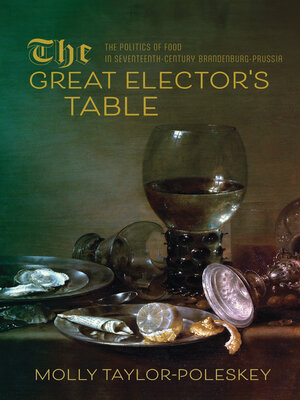The Great Elector's Table
ebook ∣ The Politics of Food in Seventeenth-Century Brandenburg-Prussia · Studies in Early Modern German History
By Molly Taylor-Poleskey

Sign up to save your library
With an OverDrive account, you can save your favorite libraries for at-a-glance information about availability. Find out more about OverDrive accounts.
Find this title in Libby, the library reading app by OverDrive.



Search for a digital library with this title
Title found at these libraries:
| Library Name | Distance |
|---|---|
| Loading... |
What food production, presentation, and consumption reveals about the exercise of power in early modern Germany
In politics, as with food, presentation is everything. At the court of Elector Friedrich Wilhelm in Brandenburg-Prussia, the two combined in a way that illuminates the social and cultural dynamics of seventeenth-century German life. In this remarkable book, the first of its kind, Molly Taylor-Poleskey offers an innovative critical approach to understanding how a particular dynasty and an unexceptional German state rose to their eminent position on the Central European stage following the devastation of the Thirty Years' War. Food, she shows, functioned both as a tool of self-aggrandizement for rulers and as a means of coercion and leverage in power negotiations. From bakers to botanists, court servants up and down the social ladder each had a role to play in the political life of this court. Moving beyond dusty bureaucratic narratives, this colorful and inviting book offers readers a new way of appreciating how culture, politics, the natural environment, and science intertwined in early modern German statecraft.
In politics, as with food, presentation is everything. At the court of Elector Friedrich Wilhelm in Brandenburg-Prussia, the two combined in a way that illuminates the social and cultural dynamics of seventeenth-century German life. In this remarkable book, the first of its kind, Molly Taylor-Poleskey offers an innovative critical approach to understanding how a particular dynasty and an unexceptional German state rose to their eminent position on the Central European stage following the devastation of the Thirty Years' War. Food, she shows, functioned both as a tool of self-aggrandizement for rulers and as a means of coercion and leverage in power negotiations. From bakers to botanists, court servants up and down the social ladder each had a role to play in the political life of this court. Moving beyond dusty bureaucratic narratives, this colorful and inviting book offers readers a new way of appreciating how culture, politics, the natural environment, and science intertwined in early modern German statecraft.







